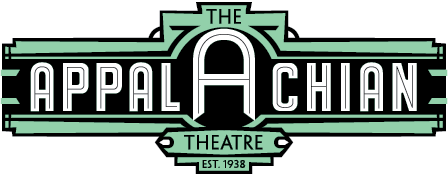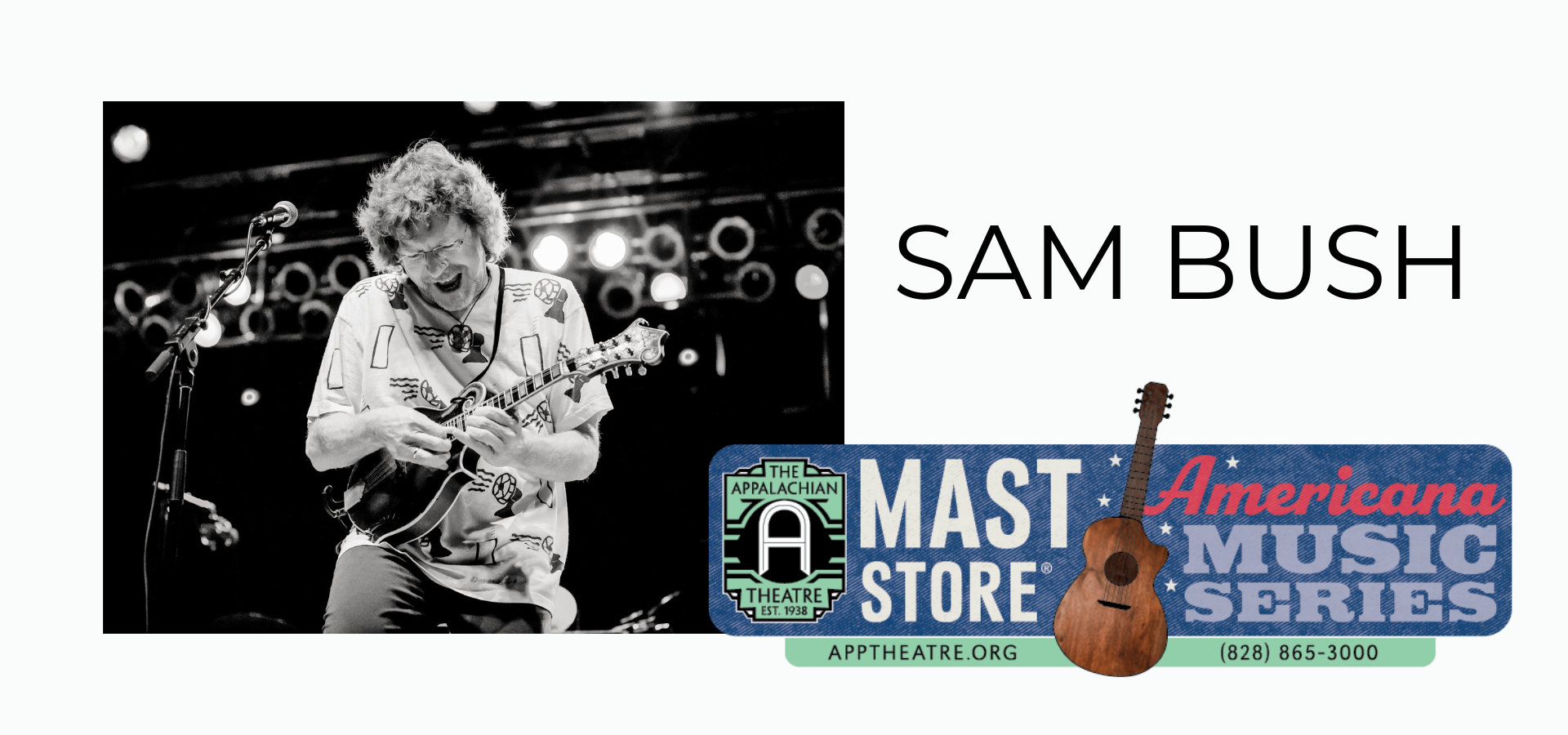Mast Store Americana Music Series presents
Sam Bush
With Special Guest Liam Purcell
Sunday, March 3, 2024 at 7:30 p.m. / Doors open at 7 p.m.
Regular Adult - $35/each* Day of Show - $42/each* Student - $15/each*
All Ages (children under 17 admitted with parent/legal guardian)
All Seating is Reserved.
*AppTheatre inclusive pricing combines fees, tax, and ticket value.
There was only one prize-winning teenager carrying stones big enough to say thanks, but no thanks to Roy Acuff. Only one son of Kentucky finding a light of inspiration from Bill Monroe and his Blue Grass Boys and catching a fire from Bob Marley and The Wailers. Only one progressive hippie allying with like-minded conspirators, rolling out the New Grass revolution, and then leaving the genre’s torch-bearing band behind as it reached its commercial peak.
There is only one consensus pick of peers and predecessors, of the traditionalists, the rebels, and the next gen devotees. Music’s ultimate inside outsider. Or is it outside insider? There is only one Sam Bush.
On a Bowling Green, Kentucky cattle farm in the post-war 1950s, Bush grew up an only son, and with four sisters. His love of music came immediately, encouraged by his parents’ record collection and, particularly, by his father Charlie, a fiddler, who organized local jams. Charlie envisioned his son someday a staff fiddler at the Grand Ole Opry, but a clear day’s signal from Nashville brought to Bush’s television screen a tow-headed boy named Ricky Skaggs playing mandolin with Flatt and Scruggs, and an epiphany for Bush. At 11, he purchased his first mandolin.
As a teen fiddler Bush was a three-time national champion in the junior division of the National Oldtime Fiddler’s Contest. He recorded an instrumental album, Poor Richard’s Almanac as a high school senior and in the spring of 1970 attended the Fiddlers Convention in Union Grove, NC. There he heard the New Deal String Band, taking notice of their rock-inspired brand of progressive bluegrass.
Acuff offered him a spot in his band. Bush politely turned down the country titan. It was not the music he wanted to play. He admired the grace of Flatt & Scruggs, loved Bill Monroe- even saw him perform at the Ryman- but he’d discovered electrified alternatives to tradition in the Osborne Brothers and manifest destiny in The Dillards.
See the photo of a fresh-faced Sam Bush in his shiny blue high school graduation gown, circa 1970. Tufts of blonde hair breaking free of the borders of his squared cap, Bush is smiling, flanked by his proud parents. The next day he was gone, bound for Los Angeles. He got as far as his nerve would take him- Las Vegas- then doubled back to Bowling Green.
“I started working at the Holiday Inn as a busboy,” Bush recalls. “Ebo Walker and Lonnie Peerce came in one night asking if I wanted to come to Louisville and play five nights a week with the Bluegrass Alliance. That was a big, ol’ ‘Hell yes, let’s go.’”
Bush played guitar in the group, then began playing mandolin after recruiting guitarist Tony Rice to the fold. Following a fallout with Peerce in 1971, Bush and his Alliance mates- Walker, Courtney Johnson, and Curtis Burch- formed the New Grass Revival, issuing the band’s debut, New Grass Revival. Walker left soon after, replaced temporarily by Butch Robins, with the quartet solidifying around the arrival of bassist John Cowan.
“There were already people that had deviated from Bill Monroe’s style of bluegrass,” Bush explains. “If anything, we were reviving a newgrass style that had already been started. Our kind of music tended to come from the idea of long jams and rock-&-roll songs.”
Shunned by some traditionalists, New Grass Revival played bluegrass fests slotted in late-night sets for the “long-hairs and hippies.” Quickly becoming a favorite of rock audiences, they garnered the attention of Leon Russell, one of the era’s most popular artists. Russell hired New Grass as his supporting act on a massive tour in 1973 that put the band nightly in front of tens of thousands.
At tour’s end, it was back to headlining six nights a week at an Indiana pizza joint. But, they were resilient, grinding it out on the road. And in 1975 the Revival first played Telluride, Colorado, forming a connection with the region and its fans that has prospered for 45 years.
Bush was the newgrass commando, incorporating a variety of genres into the repertoire. He discovered a sibling similarity with the reggae rhythms of Marley and The Wailers, and, accordingly, developed an ear-turning original style of mandolin playing. The group issued five albums in their first seven years, and in 1979 became Russell’s backing band. By 1981, Johnson and Burch left the group, replaced by banjoist Bela Fleck and guitarist Pat Flynn.
A three-record contract with Capitol Records and a conscious turn to the country market took the Revival to new commercial heights. Bush survived a life-threatening bout with cancer, and returned to the group that’d become more popular than ever. They released chart-climbing singles, made videos, earned Grammy nominations, and, at their zenith, called it quits.
“We were on the verge of getting bigger,” recalls Bush. “Or maybe we’d gone as far as we could. I’d spent 18 years in a four-piece partnership. I needed a break. But, I appreciated the 18 years we had.”
Bush worked the next five years with Emmylou Harris’ Nash Ramblers, then a stint with Lyle Lovett. He took home three-straight IBMA Mandolin Player of the Year awards, 1990-92, (and a fourth in 2007). In 1995 he reunited with Fleck, now a burgeoning superstar, and toured with the Flecktones, reigniting his penchant for improvisation. Then, finally, after a quarter-century of making music with New Grass Revival and collaborating with other bands, Sam Bush went solo.
He’s released seven albums and a live DVD over the past two decades. In 2009, the
Americana Music Association awarded Bush the Lifetime Achievement Award for Instrumentalist. Punch Brothers, Steep Canyon Rangers, and Greensky Bluegrass are just a few present-day bluegrass vanguards among so many musicians he’s influenced. His performances are annual highlights of the festival circuit, with Bush’s joyous perennial appearances at the town’s famed bluegrass fest earning him the title, “King of Telluride.”
“With this band I have now I am free to try anything. Looking back at the last 50 years of playing newgrass, with the elements of jazz improvisation and rock-&-roll, jamming, playing with New Grass Revival, Leon, and Emmylou; it’s a culmination of all of that,” says Bush. “I can unapologetically stand onstage and feel I’m representing those songs well.”
Visit Sam Bush to learn more.
Liam Purcell turned heads in 2022 by sweeping the Rockygrass Instrumental Championships on Guitar, Mandolin, and Banjo, becoming the first person in history to do so.
Growing up just down the road from Doc Watson, Liam Purcell is the bandleader for “Cane Mill Road” as they rock the traditional bluegrass standards they were raised on, yet boldly write original music with roots in the fertile grounds of bluegrass, old-time, and Americana. Their powerful arrangements and dynamic stage presence have landed them main stage slots at legendary festivals across the country.
Know Before You Go
THIRD PARTY SELLERS / SECONDARY MARKET
Tickets for events at the Appalachian Theatre of the High Country are sold exclusively through the theatre box office and online at AppTheatre.org . We DO NOT partner with third party sellers. We DO NOT accept tickets sold on the secondary market. We reserve the right to decline entry if you are not the original ticket buyer.
Tickets purchased from alternative sources may be any or all of the following:
· Not authentic
· Over-priced
· Invalid (cannot be used to enter the event)
The Appalachian Theatre of the High Country (ATHC) is not responsible for tickets purchased from third party vendors and is not able to honor, replace or refund invalid tickets. Please purchase your tickets from approved sources.
PARKING INFORMATION
Please carefully read the information and instructions below to ensure the best experience when you visit the theatre.
Metered street parking and pay lots are monitored and parking is enforced Monday – Saturday from 8 a.m. until 5 pm except on town observed holidays.
Parking is $1.00/hour at all metered parking spaces.
Metered & lot parking is free all day on Sundays and every day after 5 p.m.
Parking in Appalachian State parking lots (e.g. the Peacock Lot accessed off of Howard Street) is available for free on week nights after 7 p.m. and on non-gameday/event weekends on Saturday and Sunday.
Accessible Parking:
Parking in metered parking areas is free, as long as the correct placard/license plate is displayed and up to date.
ATHC does not own or operate any parking lots or meters and cannot accept responsibility for any parking mishaps or fees.
Visit our HEALTH & SAFETY PROTOCOLS page for the latest in show attendance requirements, FAQs and other information.








